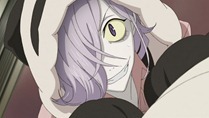 |
 |
 |
Like Mashiro-iro Symphony, UN-GO was a series that failed to captivate me out of the box and turned into one of the better shows of the Fall season.
With it’s odd source material, strange character designs and washed-out visual style the initial impression was more off-putting than striking. And it didn’t help that the first mystery was somewhat obvious and poorly constructed. But from there, the quality train was a one-way express – the series continued to improve, slowly at first and then picking up steam. The mysteries got better and better, with the RAI story that introduced Kazamori really the first indication that the mystery side of the show could be something really special.
As this was happening, the show was burrowing its way into my consciousness through other channels as well. The characters, who at first seemed somewhat stiff and flat, became more and more interesting and I began to care about what happened to them. And the series was revealing itself as incredibly smart, creating its own fascinating alternative-present mythology that playfully twisted the realities of Japanese history and current global politics into a funhouse-mirror version of today’s world that often seemed a little too close to reality for comfort. The politics was the cornerstone of this show more than the mysteries themselves, which is why it was so fitting that the final mystery was fused so completely with the political intrigue underpinning the series. No show this year – and maybe for a few years – examined political issues with as much insight and wit as UN-GO. In a year where we’ve seen several anime seemingly adopt a xenophpbic and somewhat nationalistic tone, UN-GO attacked those ideals head-on in the person of its protagonist, who in the final episode specifically decried the false ideology that took Japan to its near-destruction in the second world war.
The series managed to tie in the “Episode 0” mythology at the very end, as Shinjuro took Rie to the scene where it all happened and explained his story – and Inga’s – to her. That he would do so under the circumstances says something about Shinjuro as a character. Despite having just exposed her father’s corruption and accused him of murder, he recognizes that Rie is a different person, and puts his faith in the power of the truth to guide events. Rie is more aligned with Shinjuro ideologically than with her father, though unlike Shinjuro she still seems to do so from a position of eager idealism. Shinjuro went from being a cipher to looking like something of a tragic figure, before revealing himself in the end to be a rather proud and defiant man. He’s a soldier for the truth, and as such he will always be Kaishou’s enemy – though a grudging respect certainly exists between them. I suspect Shinjuro might not even be opposed to Kaishou’s stated goal of a world without borders, though he would never walk the path Kaishou walks to try and get there.
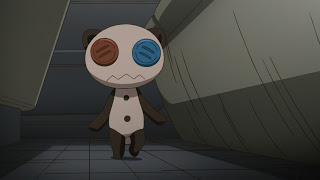 As for what sort of relationship ultimately exists between Shinjuro and Inga, that seems to be a matter left to speculation. I think some sort of affection has grown between them, and I don’t think Shinjuro’s concern for Inga after his disappearance was solely a practical one. Inga is certainly an odd duck, one of the weirdest characters of the year – a boy, a woman, a youkai, a kami. In its own way Inga is a soldier for the truth, too, as Inga literally consumes the truth in order to live. Theirs is a marriage of convenience I suppose, but a marriage just the same. With the utterly fascinating Kazamori added to the mix they make an appealing trio that I’d love to see more of. Kazamori added so much to the series with her offbeat RAI perspective, a wry and cutting view of humanity cut through with a great deal of curiosity and just a hint of longing to be a part if it.
As for what sort of relationship ultimately exists between Shinjuro and Inga, that seems to be a matter left to speculation. I think some sort of affection has grown between them, and I don’t think Shinjuro’s concern for Inga after his disappearance was solely a practical one. Inga is certainly an odd duck, one of the weirdest characters of the year – a boy, a woman, a youkai, a kami. In its own way Inga is a soldier for the truth, too, as Inga literally consumes the truth in order to live. Theirs is a marriage of convenience I suppose, but a marriage just the same. With the utterly fascinating Kazamori added to the mix they make an appealing trio that I’d love to see more of. Kazamori added so much to the series with her offbeat RAI perspective, a wry and cutting view of humanity cut through with a great deal of curiosity and just a hint of longing to be a part if it.
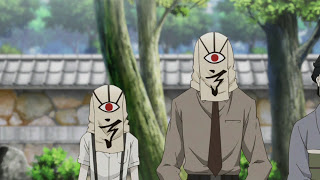 Of course I think it’s highly unlikely we will see any more of these characters, at least in anime form. This series is one of the least commercial I can recall – it’s not pretty, it has no moe (maybe a bit with Kazamori), it’s dense and difficult and requires a lot of hard work to yield up its delights, though they’re well worth the effort. Sentai has licensed Episode 0 so we’ll likely see that released on Blu-ray, at least, but the “other” NoitaminA show this fall seems destined to go down as a barely-known curiosity, which is a real shame as it’s one of the smartest and oddest shows I’ve seen in a while. And though I’d never have believed I’d say it a couple of months ago, I think UN-GO managed to give this NoitaminA block one “heart show” after all, though one of a much more caustic and remote nature than the ones that preceded it in 2011.
Of course I think it’s highly unlikely we will see any more of these characters, at least in anime form. This series is one of the least commercial I can recall – it’s not pretty, it has no moe (maybe a bit with Kazamori), it’s dense and difficult and requires a lot of hard work to yield up its delights, though they’re well worth the effort. Sentai has licensed Episode 0 so we’ll likely see that released on Blu-ray, at least, but the “other” NoitaminA show this fall seems destined to go down as a barely-known curiosity, which is a real shame as it’s one of the smartest and oddest shows I’ve seen in a while. And though I’d never have believed I’d say it a couple of months ago, I think UN-GO managed to give this NoitaminA block one “heart show” after all, though one of a much more caustic and remote nature than the ones that preceded it in 2011.
 |
 |
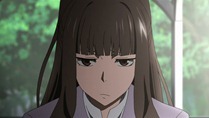 |
 |
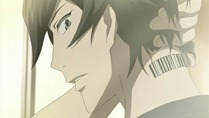 |
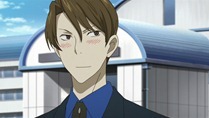 |
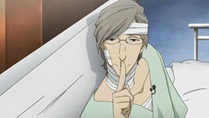 |
 |
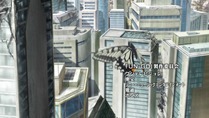 |


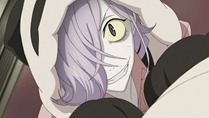
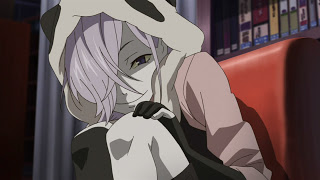
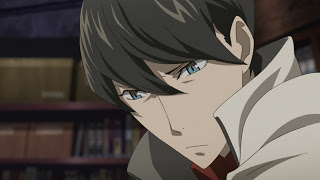
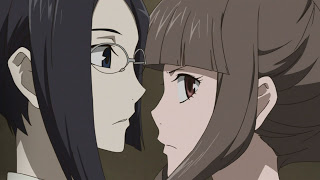


Airon
December 24, 2011 at 9:07 amA wonderful series. I remember watching this at the start and being askeed by a friend whether it was any good; I scoffed at it and told him it's not for him, too simple and boring, as a whole. Amazingly, a few weeks after I told him that it's looking to be a great show and he shouldn't watch it because he probably won't like having to do as much as this show asks of its viewers to enjoy it.
Sadly that's precisely why, despite having grown to care about Shinjuro, Inga, and Kazamori, we probably will not see what will happen to them or to Kaishou and Rie or this Alternate world. This show wants more than the typical audience will give anime these days, and that makes it both a wonderful piece of art and a terrible anime all at once.
Here's hoping we get at least a visit or two from these characters in the future, I don't want them forgotten and lost in obscurity. If anything, we might be headed towards a future where the message this anime portrays is the only hope for modern Japan.
admin
December 24, 2011 at 9:15 amI agree, Airon – UN-GO demands active audience participation and most audiences just don't have the patience for that. Thus, lazy series like GC that also have a subversively easy to swallow political viewpoint.
Eric J.S.
December 24, 2011 at 10:37 amI like most series that challenge me to analyze. I was able to predict some of it, but the more dramatic turns were purposely impossible to predict.
My favorite parts were the subplot of how the government controls the people with information and secret operations during and after the "war."
Other than that, I really enjoyed the characters very much, especially Kazamori.
Karmafan
December 24, 2011 at 2:22 pmI too really liked Kazamori. I liked this series and like GE it grew on me more as each week passed. I didn't care so much for the arc we just had with Inga being controlled by a "god" of sorts.
To have these godlike characters (including Inga) and never explain where they come from in a series thats all about explaining mysteries kinda leaves a bad taste in my mouth.
One other thing that didn't get mentioned… the show had a great OP and ED that help set the mood for this show. The music is a large unrecognized part of any anime series and some series have music that is dead on perfect for their series like Buku wa Tomodachi, Fate Zero, Guilty Crown, Kimi To Boku, Last Exile, Maken Ki, MPD, Nurarihyon, Shana, Shinryaku, Tamayura, and Working.
elianthos
April 5, 2012 at 8:47 pmUn-Go is a series I've watched with growing fondness for the very same reasins you stated in your review. I'm looking forward to Inga-Ron later this April. Hopefully subs won't be long in coming ^^.
elianthos
April 5, 2012 at 8:48 pmP.S.: also, DAT ENDING SONG <3